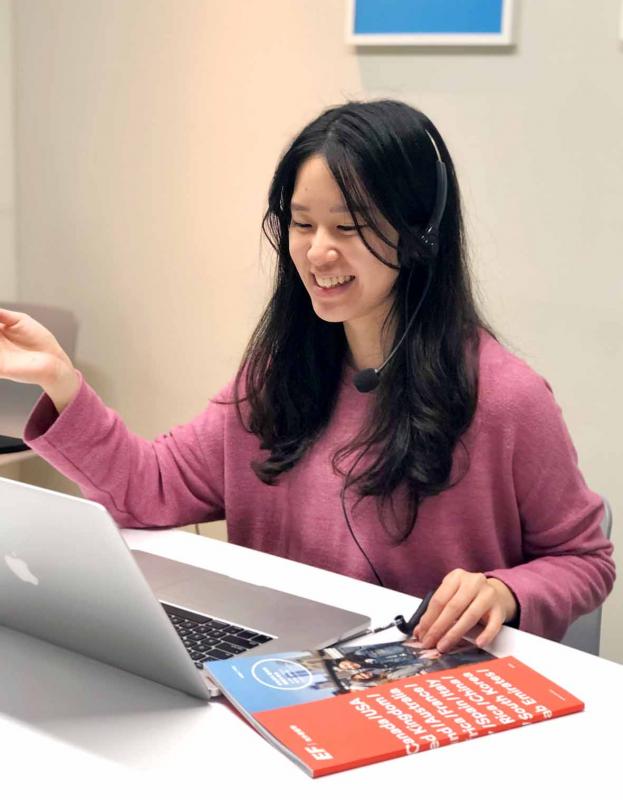Prior to the COVID-19 outbreak, the number of Taiwanese studying outside the country at any one time often exceeded 70,000. Before going abroad, many of them sought advice from companies that specialize in helping students book language courses or gain admission to foreign universities. But because of the pandemic and consequent travel restrictions, Taiwan’s overseas-study counseling industry is on course for a dismal year.
Eri Liao (廖為慶), founding partner of StudyLawyer, a company that specializes in helping clients gain admission to law schools in North America and elsewhere, says that compared to last year, business in the first quarter of 2020 was down 20 to 25 percent.
Liao says that applications to UK schools have been more impacted than those to the US.

Photo Courtesy of EF Education First
“About 10 percent of our clients who’ve received offers have asked for a one-year deferred enrollment, but only a few law schools have agreed,” he says.
Liao, who oversees branches in Taipei, Shanghai and Hong Kong, doesn’t think the pandemic will dent local enthusiasm for overseas education. Globalization is driving demand for talented individuals with international backgrounds, he says.
“Studying abroad is a necessary step to improve one’s competitiveness. If there’s a global economic downturn, more candidates will chase fewer positions, and this will push job seekers to better themselves,” Liao says.
The epidemic’s impact became noticeable just after Lunar New Year, say Pieter Funnekotter, CEO of the UKEAS Group, and Laurent Morel, Taiwan general manager of EF Education First.
UKEAS — which was founded in Taiwan in 1993 — provides free counseling and application services for Taiwanese students who wish to study in the UK, US and other countries. It earns a commission each time a client books a language course or is accepted by a university.
UKEAS doesn’t plan to close any of its nine offices in Taiwan, or furlough some of its 80-odd employees, in order to cut costs.
“Downsizing our staff just isn’t possible,” Funnekotter says. “They’re very busy collecting updates from our partners around the world and contacting our students [abroad] to understand their circumstances. The number of inquiries we’ve received this year is no less than the same period last year, and we continue to have new applicants for September 2020 and beyond.”
EF Education First is less reliant on summer groups compared to some others in the industry, says Morel. He thinks that “short-term programs and less academic options will probably be the most impacted… Some of our customers have postponed their plans, and as our campuses operate all year round, we can accommodate that.”
EF’s four Taiwan offices are open as usual for face-to-face consultations.
“However, we’re doing more online live meetings, Webinars and consultations for people who prefer to stay at home,” says Morel, who strikes a note of optimism.
“The current situation is disrupting the plans of thousands of students, but I’m confident it’s only temporary. Taiwanese understand the importance and the benefits of studying abroad,” Morel says.

Wooden houses wedged between concrete, crumbling brick facades with roofs gaping to the sky, and tiled art deco buildings down narrow alleyways: Taichung Central District’s (中區) aging architecture reveals both the allure and reality of the old downtown. From Indigenous settlement to capital under Qing Dynasty rule through to Japanese colonization, Taichung’s Central District holds a long and layered history. The bygone beauty of its streets once earned it the nickname “Little Kyoto.” Since the late eighties, however, the shifting of economic and government centers westward signaled a gradual decline in the area’s evolving fortunes. With the regeneration of the once

Even by the standards of Ukraine’s International Legion, which comprises volunteers from over 55 countries, Han has an unusual backstory. Born in Taichung, he grew up in Costa Rica — then one of Taiwan’s diplomatic allies — where a relative worked for the embassy. After attending an American international high school in San Jose, Costa Rica’s capital, Han — who prefers to use only his given name for OPSEC (operations security) reasons — moved to the US in his teens. He attended Penn State University before returning to Taiwan to work in the semiconductor industry in Kaohsiung, where he

On May 2, Chinese Nationalist Party (KMT) Chairman Eric Chu (朱立倫), at a meeting in support of Taipei city councilors at party headquarters, compared President William Lai (賴清德) to Hitler. Chu claimed that unlike any other democracy worldwide in history, no other leader was rooting out opposing parties like Lai and the Democratic Progressive Party (DPP). That his statements are wildly inaccurate was not the point. It was a rallying cry, not a history lesson. This was intentional to provoke the international diplomatic community into a response, which was promptly provided. Both the German and Israeli offices issued statements on Facebook

Perched on Thailand’s border with Myanmar, Arunothai is a dusty crossroads town, a nowheresville that could be the setting of some Southeast Asian spaghetti Western. Its main street is the final, dead-end section of the two-lane highway from Chiang Mai, Thailand’s second largest city 120kms south, and the heart of the kingdom’s mountainous north. At the town boundary, a Chinese-style arch capped with dragons also bears Thai script declaring fealty to Bangkok’s royal family: “Long live the King!” Further on, Chinese lanterns line the main street, and on the hillsides, courtyard homes sit among warrens of narrow, winding alleyways and